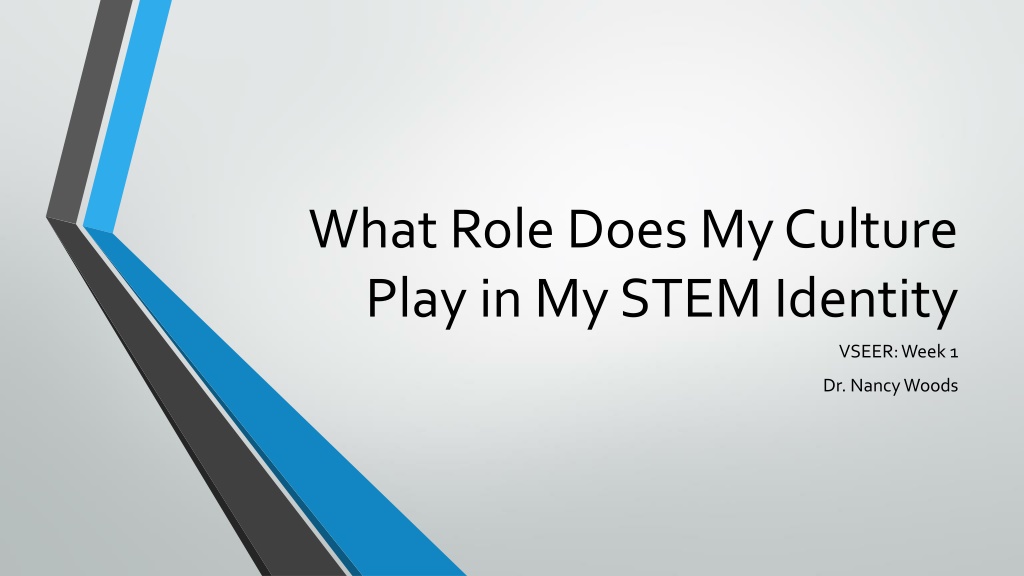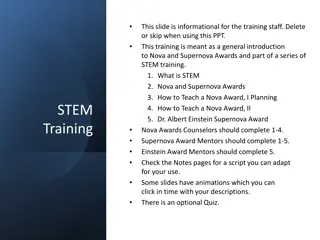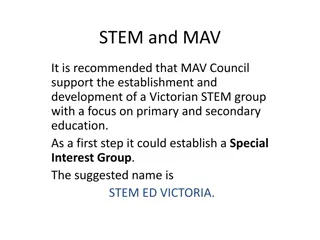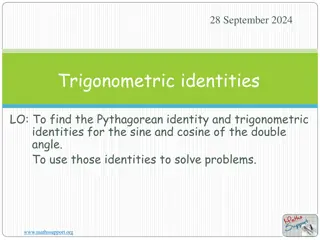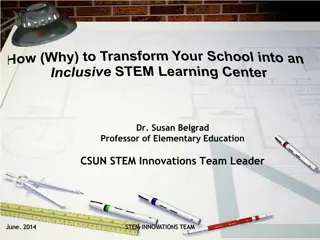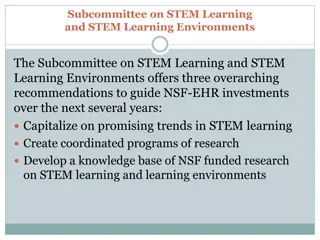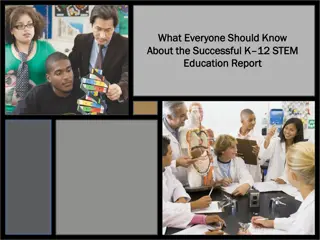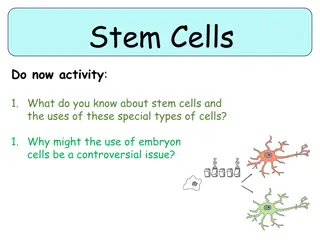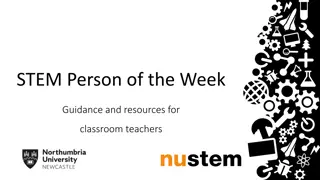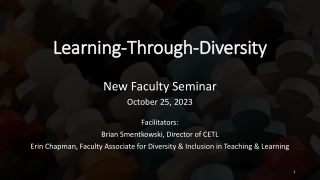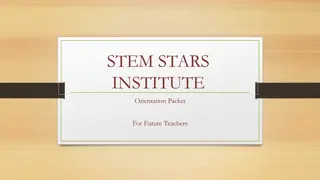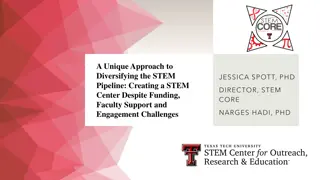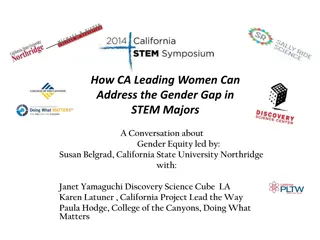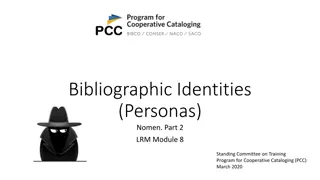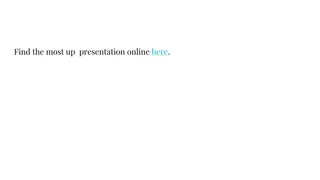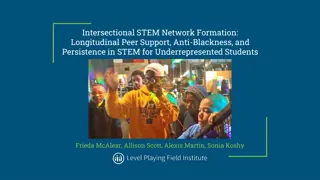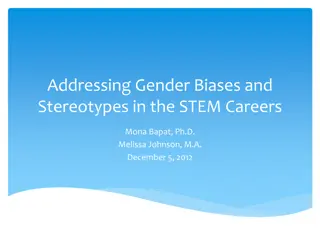Understanding the Role of Culture in STEM Identities
This presentation explores the significance of culture in shaping one's STEM identity through activities like defining culture, sharing personal experiences, and building community relationships in a virtual summer research program. Participants engage in discussions, artistic expressions, and group roles rotation to deepen their understanding and sense of belonging in STEM fields.
Download Presentation

Please find below an Image/Link to download the presentation.
The content on the website is provided AS IS for your information and personal use only. It may not be sold, licensed, or shared on other websites without obtaining consent from the author. Download presentation by click this link. If you encounter any issues during the download, it is possible that the publisher has removed the file from their server.
E N D
Presentation Transcript
What Role Does My Culture Play in My STEM Identity VSEER: Week 1 Dr. Nancy Woods
Agenda Overview/Purpose of Community Building Group Roles Culture Cultural Introduction Intersectionality: My Culture and My STEM Identity Closure
Overview/Purpose The Community Building segment of the Virtual Summer Experience for Early Researchers: Serves as a space and community for you to build relationships with peers and staff, Provides a launch pad for your future academic, professional, and social relationships, Provides a community of facilitators as resources and chains in your network, and Is a counter space for students to solidify your sense of belonging in STEM.
Guiding Principles Be authentic Use I statements -Speak from personal experience Listen respectfully and allow each person s voice to be heard Respect each other Fulfil my responsibilities to the community Be prepared, be present, actively participate Professionalism
Group Members Roles Within the group, roles are rotated each week. Facilitator: Ensures the group stays focus in order to accomplish goals/objectives in a timely manner. Recorder/Presenter: Serves as the group s note taker. The recorder summarizes the group s discussion/thoughts and reports them succinctly to the larger community. Researcher (at least 2): responsible for finding additional relevant resources to assist your group members and the larger VSEER community in deepening their knowledge of the content/topic. Respect each other s voice.
What is Culture? Watch this video https://www.youtube.com/watch?v=57KW6RO8Rcs
Introduction (Small Group) 12 minutes Open Canvas and access the Cultural Identity Activity. In your own words, develop your working definition of culture. This definition may be revised as you advance through VSEER. Based on your definition of culture, draw a picture or write an essay that will help the community learn and understand your culture. Be prepared to share your masterpiece as well as answer questions about your culture. You will use your essay or drawing to introduce yourself to your group.
Sharing and Listening What were the commonalities within your group on the definition of culture?
Culture: Formal Definitions Shared patterns of behaviors and interactions, cognitive constructs and understanding that are learned by socialization. (Center for Advance Research on Language Acquisition) Culture is the characteristics and knowledge of a particular group of people, encompassing language, religion, cuisine, social habits, music and arts.
Culture is the characteristics and knowledge of a particular group of people, encompassing language, religion, cuisine, social habits, music and arts. TheCenter for Advance Research on Language Acquisition goes a step further, defining culture as shared patterns of behaviors and interactions, cognitive constructs and understanding that are learned by socialization. Thus, it can be seen as the growth of a group identity fostered by social patterns unique to the group. "Culture encompasses religion, food, what we wear, how we wear it, our language, marriage, music, what we believe is right or wrong, how we sit at the table, how we greet visitors, how we behave with loved ones, and a million other things," Cristina De Rossi, an anthropologist at Barnet and Southgate College in London, told Live Science. The word "culture" derives from a French term, which in turn derives from the Latin "colere," which means to tend to the earth and grow, or cultivation and nurture. "It shares its etymology with a number of other words related to actively fostering growth," De Rossi said. Retrieved 5/17/2021 from LiveScience https://www.livescience.com/21478-what-is-culture-definition-of-culture.html
Community Discussion 1. What aspects of the definition of culture surprised you? 2. Based on Reading 3: Scientist and the Scientific Community, in what ways did the culture and shared experiences of Gregory Mendel, Dr. Stefanie Raymond- Whish, Dr. Adam Sylvester, and the band members of Nunatak influence their STEM identity and research focus? 3. What aspects of your culture can you tap into to help you be successful in the VSEER Program? 4. What role does your culture play in you being a successful student? 5. How does your culture influence how you view yourself as a scientist? 6. How can you as a student use cultural differences between you, the students, and the staff in this program to enhance your learning experience? 7. How can you as a student use cultural differences to develop your identity as a scientist?
Community Share Group 1: 1,2, 3 Group 2: 1, 2, 4 Group 3: 1, 2, 5 Group 4: 1, 2, 6 Group 5: 1, 2, 7
Live Out Loud! Each person, please take this time to share one thing you learned/gained from this interaction with your community members and answer either question 1 or 2. 1. What role does your culture play in you being a successful student? 2.How does your culture influence how you view yourself as a scientist?
Whats Next? Personal Board of Directors Right now, what is your goal or vision in choosing a STEM major? Write out your vision. Read the article A Personal Board of Director s Can Help you Navigate Challenges in Your Career located at https://www.sciencemag.org/careers/2020/03/personal-board-directors- can-help-you-navigate-challenges-your-career Thinking about your goal/vision, create your personal board of directors, including a mix of faculty, a peer, a community member, a family member, and a professional in the field, who would support you in your educational, personal, and professional success. Beside each person s name indicate how you believe each will contribute to your educational, personal, and professional success. We will use this during Week 2. Submit your personal board of directors assignment by June 16, 2022
Just for fun..... Do some research across the internet and find out about at least one SERENDIPIDOUS scientific discovery. Try to find an unusual one that no one else would find. Be ready to share the story behind this discovery on Thursday June 16, 2022.
